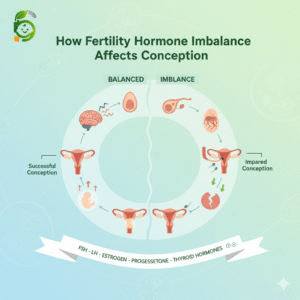Fertility Hormone Imbalance | Strong Symptoms and Effective Treatments 2025

Signs of Fertility Hormone Imbalance in Both Men and Women
 If you’ve been trying to start a family and things feel off, fertility hormone imbalance in both male and female bodies might be the quiet reason behind it. Hormones are like the body’s messengers, guiding everything from egg release in women to sperm production in men. When these signals get mixed up, it can make conception tougher than it should be. But here’s the good news: understanding this early opens doors to simple fixes and hopeful journeys. At EIRMED, we see so many couples turn things around with the right knowledge and support. Let’s walk through what this means for you, step by step, so you feel less alone and more in charge.
If you’ve been trying to start a family and things feel off, fertility hormone imbalance in both male and female bodies might be the quiet reason behind it. Hormones are like the body’s messengers, guiding everything from egg release in women to sperm production in men. When these signals get mixed up, it can make conception tougher than it should be. But here’s the good news: understanding this early opens doors to simple fixes and hopeful journeys. At EIRMED, we see so many couples turn things around with the right knowledge and support. Let’s walk through what this means for you, step by step, so you feel less alone and more in charge.
What are hormones?
Hormones are the body’s chemical messengers.
They are signaling molecules produced by specialized glands (called endocrine glands) and tissues, and their primary function is to travel through the bloodstream to distant organs and tissues, where they regulate and coordinate nearly all of the body’s functions.
Here is a breakdown of their definition, production, and function:
1. What Hormones Are
- Chemical Messengers: Hormones are chemical substances that carry messages from one part of the body to another.
- Secretion: They are secreted (released) directly into the bloodstream by glands that make up the endocrine system (like the pituitary, thyroid, adrenal glands, ovaries, and testes).
- Targeted Action: Although hormones travel throughout the entire body, they only work on cells that have specific receptors for them. You can think of the hormone as a key and the cell receptor as a lock—only the correct key can open the lock and deliver the message.
2. What Hormones Do (The Function)
Hormones control or regulate most major bodily processes. A tiny change in a hormone’s level can cause significant changes throughout the body.
3. Key Concept: Hormone Imbalance
Since hormones are powerful and work in tiny amounts, it is vital that they stay tightly controlled.
A hormone imbalance occurs when the body produces too much or too little of a specific hormone, leading to health issues, such as the fertility problems or conditions like PCOS that you previously asked about.
Understanding Fertility Hormone Imbalance in Both Male and Female
 Hormones keep our reproductive systems running smoothly, but when levels shift too high or too low it creates a ripple effect. For women, this often ties to conditions like polycystic ovary syndrome (PCOS), where male-like hormones called androgens build up and block regular ovulation. In men, low testosterone can slow sperm creation, leading to fewer or weaker swimmers. This imbalance isn’t rare; it affects up to 10% of women of childbearing age and a similar share of men facing fertility challenges.
Hormones keep our reproductive systems running smoothly, but when levels shift too high or too low it creates a ripple effect. For women, this often ties to conditions like polycystic ovary syndrome (PCOS), where male-like hormones called androgens build up and block regular ovulation. In men, low testosterone can slow sperm creation, leading to fewer or weaker swimmers. This imbalance isn’t rare; it affects up to 10% of women of childbearing age and a similar share of men facing fertility challenges.
Think of it like a garden out of sync too much rain drowns the plants, too little starves them. Daily stresses, poor sleep, or even extra pounds can tip the scales. But spotting it early changes everything. At EIRMED, our fertility kits and hormone-balancing supplements help many couples reset naturally before jumping to bigger steps.
What Causes Fertility Hormone Imbalance in Women?
 For women, the triggers often start with the ovaries and brain signals. PCOS tops the list, caused by genes, insulin resistance (when your body doesn’t use sugar well), or inflammation from diet. Thyroid problems, either underactive (hypothyroidism) or overactive mess with estrogen and progesterone, the key players in monthly cycles. Age plays a role too; as you near 35, natural dips in follicle-stimulating hormone (FSH) can signal perimenopause sneaking in early.
For women, the triggers often start with the ovaries and brain signals. PCOS tops the list, caused by genes, insulin resistance (when your body doesn’t use sugar well), or inflammation from diet. Thyroid problems, either underactive (hypothyroidism) or overactive mess with estrogen and progesterone, the key players in monthly cycles. Age plays a role too; as you near 35, natural dips in follicle-stimulating hormone (FSH) can signal perimenopause sneaking in early.
Environmental factors sneak up quietly. Exposure to plastics with hormone-like chemicals (called endocrine disruptors) or chronic stress that spikes cortisol can throw off the rhythm. Even skipped meals or yo-yo dieting affects insulin, linking back to PCOS. If you’ve noticed weight creeping up despite your efforts or cycles that wander like lost puppies, these could be clues.
What Causes Fertility Hormone Imbalance in Men?
Men aren’t immune, hormone shifts hit sperm health hard. Low testosterone, or hypogonadism, often stems from pituitary gland issues in the brain, where FSH and luteinizing hormone (LH) should kickstart production. Varicoceles, swollen veins in the scrotum, raise heat and disrupt signals, mimicking an internal summer day for delicate sperm.
Lifestyle culprits abound: heavy drinking, smoking, or anabolic steroids from gym habits can crash testosterone levels. Obesity packs fat that converts testosterone to estrogen, flipping the script. Medical history matters, past mumps, chemotherapy, or undiagnosed diabetes quietly erode balance. Imagine your body’s engine running on low octane; that’s how men describe the fatigue and frustration when trying to build a family.
Common Symptoms of Fertility Hormone Imbalance
 Symptoms whisper before they shout, but listening early saves heartache. Fertility hormone imbalance shows up differently in men and women, yet both share that nagging sense something’s not right.
Symptoms whisper before they shout, but listening early saves heartache. Fertility hormone imbalance shows up differently in men and women, yet both share that nagging sense something’s not right.
Signs in Women
Irregular periods are the loudest alarm, cycles shorter than 21 days or longer than 35, or spotting between flows. Acne that lingers past teen years, unwanted hair on the chin or chest (hirsutism), or thinning scalp hair signal androgen overload. Weight gain around the middle, despite healthy eating, ties to insulin resistance. Mood swings, hot flashes, or constant tiredness round it out, making daily life feel heavier.
One patient shared with us at EIRMED how her “forever bloating” turned out to be progesterone dips, fixed with targeted supplements. If these ring true, you’re not imagining it your body is asking for help.
Signs in Men
For men, it’s subtler: erectile challenges, low sex drive, or shrinking muscle mass despite workouts. Breast tissue growth (gynecomastia), fatigue that coffee can’t fix, or mood dips like unexplained irritability point to testosterone shortfalls. Sperm tests might reveal low counts or poor motility, but early signs like hot flashes (yes, men get them) or sleep troubles often appear first.
Picture a dad-to-be feeling “off his game” at work and home that’s how many describe it. At EIRMED, our male fertility panels catch these early, offering clarity and quick wins.
Common Causes of Fertility Hormone Imbalance in Women
For many women, the roots trace to everyday factors. Polycystic ovary syndrome (PCOS) often stems from insulin resistance, where your body struggles with sugar, spiking androgens and halting ovulation. Thyroid woes, like hypothyroidism, slow everything down, dropping estrogen and messing with cycles. Age creeps in too after 35, FSH rises as eggs dwindle, signaling early imbalance.
Outside influences matter. Plastics with endocrine disruptors mimic hormones, confusing your system. Chronic stress pumps cortisol, blocking progesterone. Poor diets low in nutrients fuel inflammation, worsening PCOS. If your jeans feel tighter or periods wander, these clues point here. EIRMED’s herbal blends target these, helping many smooth out without heavy meds.
Common Causes of Fertility Hormone Imbalance in Men
Men face their own culprits. Low testosterone often links to pituitary signals faltering, where LH and FSH don’t spark enough production. Varicoceles overheat the area, damaging sperm pathways. Lifestyle hits hard booze and smokes crash levels, while steroids from workouts mimic hormones, shutting down natural output.
Weight plays big; fat cells convert testosterone to estrogen, tipping scales. Past illnesses like mumps or diabetes erode quietly. If workouts leave you wiped or moods dip, listen up. EIRMED’s zinc-rich male boosters have turned tides for guys, rebuilding from within
Signs of Hormonal Imbalance After Abortion
After an abortion, your body resets, but hormones can lag, causing ups and downs. Mood swings hit as progesterone and estrogen plummet suddenly, like a post-pregnancy drop but faster. Fatigue lingers from this shift, plus anxiety spikes with cortisol in flux. Acne or skin changes pop up as androgens rebound unevenly.
Periods might delay 4-8 weeks, with spotting or heavy flows signaling imbalance. Some feel disconnected emotionally, a natural reboot phase. Gentle support like rest and nutrition helps; EIRMED’s post-care kits ease this transition, restoring calm.
Can Hormone Imbalance Cause Dizziness?
Yes, it can, hormonal vertigo ties to estrogen dips messing with inner ear fluids or blood flow. During cycles or menopause, these shifts trigger spins or unsteadiness. Thyroid imbalances amplify it, as low hormones disrupt balance centers.
Stress-fueled cortisol highs add lightheadedness. If dizzy spells pair with hot flashes or fatigue, hormones likely play in. Lifestyle fixes like hydration and yoga steady things; EIRMED supplements balance these for clearer days.
How Fertility Hormone Imbalance Affects Conception
 When hormones falter, conception stalls. In women, missed ovulation means no egg for sperm to meet, turning fertile windows into question marks. Thin uterine linings from low progesterone make implantation tricky, like trying to plant seeds in dry soil. For men, imbalanced FSH/LH cuts sperm quality, reducing chances even with perfect timing.
When hormones falter, conception stalls. In women, missed ovulation means no egg for sperm to meet, turning fertile windows into question marks. Thin uterine linings from low progesterone make implantation tricky, like trying to plant seeds in dry soil. For men, imbalanced FSH/LH cuts sperm quality, reducing chances even with perfect timing.
Couples face longer waits, months turning to years, plus emotional tolls like doubt or strain in relationships. But knowledge flips the script; many at EIRMED regain hope once imbalances are named and tamed.
Diagnosing Fertility Hormone Imbalance
Diagnosis starts simple: a chat about your history, then blood draws on specific cycle days for women (day 3 for FSH, day 21 for progesterone) or mornings for men’s testosterone. Ultrasounds spot ovarian cysts in PCOS or thyroid scans rule out gland glitches. Semen analysis for men checks volume and shape.
At EIRMED, our at-home kits make this easy, no clinic rush. Results guide next steps, turning “why us?” into “here’s how.”
Treatment Options for Fertility Hormone Imbalance
Relief comes in layers, from pills to lifestyle tweaks. Tailored plans at EIRMED blend both for lasting wins.
For Women
Medications like metformin ease insulin in PCOS, while clomiphene boosts ovulation. Hormone patches or birth control pills steady cycles short-term. IVF shines for stubborn cases, with EIRMED’s fertility meds prepping eggs perfectly. Surgery rarely nips cyst sources.
For Men
Testosterone gels or injections revive levels, paired with clomiphene to spark natural production. Varicocele fixes via minor surgery boost counts by 30-50%. EIRMED’s male supplements with zinc and antioxidants support from within.
Success stories flood our inbox, couples conceiving naturally post-treatment, proving balance restores possibility.
Symptoms of Hormonal Imbalance After Total Hysterectomy
A total hysterectomy yanks ovaries too, slamming you into surgical menopause. Hot flashes surge as estrogen vanishes, night sweats disrupt sleep. Mood swings and irritability follow, with vaginal dryness adding discomfort.
Bone density dips faster, risking aches. Fatigue and brain fog cloud thoughts.
Lifestyle Changes to Balance Hormones Naturally
You hold power here: eat whole foods rich in omega-3s (salmon, walnuts) to fight inflammation. Aim 30 minutes daily walks, exercise without extremes calms cortisol. Sleep 7-9 hours; dim lights wind down the brain’s stress switch. Stress-busters like yoga or journaling lower androgens.
Track cycles with apps for patterns. At EIRMED, our hormone-friendly meal plans and herbal blends make this joyful, not dutiful. Small shifts yield big harvests.
When to Seek Help from EIRMED
If you’ve tried six months without luck under 35 (or three over), or spot symptoms like we discussed, reach out. EIRMED’s experts craft personal paths, from kits to full treatments. You’re not just a patient, you’re family in the making.
Frequently Asked Question
What is a hormonal imbalance that causes infertility?
It is an incorrect quantity, too much, too little, or ill-timed—of one or more hormones essential for reproduction (e.g., FSH, LH, Progesterone, Estrogen). It is considered the leading cause of infertility in women.
How does a hormone imbalance affect my ability to get pregnant?
It primarily disrupts the delicate balance required for a regular menstrual cycle and prevents or delays ovulation (anovulation), meaning no mature egg is released for fertilization.
Can men have a fertility hormone imbalance?
Yes. In men, an imbalance (most commonly low Testosterone and low FSH/LH) can severely affect sperm production, leading to low sperm count, poor quality, and decreased sex drive.
Is this problem treatable?
Which hormones should I have tested if I am struggling to conceive?
The primary hormones tested are: FSH, LH, Progesterone, Estrogen (Estradiol), Prolactin, and Thyroid Hormones (TSH, T3, T4). Anti-Müllerian Hormone (AMH) is also tested to estimate ovarian reserve (egg count).
What is the most common condition that causes hormone-related infertility?
Polycystic Ovary Syndrome (PCOS). This condition involves high levels of androgens (male hormones) and often insulin resistance, which directly interferes with ovulation.
What does low progesterone mean for fertility?
Low progesterone in the second half of the cycle (luteal phase) can prevent a fertilized egg from successfully implanting in the uterine lining, potentially leading to early miscarriage or difficulty sustaining a pregnancy.
Does my thyroid affect my fertility?
Absolutely. Both an overactive (hyper-) and underactive (hypothyroidism) thyroid can throw off the balance of reproductive hormones, leading to irregular periods, anovulation, and increased risk of miscarriage.
What are the key symptoms of a fertility hormone problem?
Irregular, absent, or heavy menstrual cycles are the most common sign. Other symptoms include unexplained weight gain (especially around the abdomen), persistent acne, excessive facial/body hair (hirsutism), or thinning hair on the head.
How do doctors diagnose a hormonal imbalance?
Diagnosis is typically confirmed through blood tests drawn at specific times in the menstrual cycle. Doctors also look at a combination of symptoms, medical history, and sometimes an ultrasound to check the ovaries (e.g., for PCOS).
Can stress cause hormonal imbalance and affect my period?
Yes. Chronic high stress raises cortisol levels, which can suppress the function of reproductive hormones (like LH and FSH), leading to irregular cycles, delayed ovulation, or missed periods.
How can I balance my hormones naturally for fertility?
Lifestyle modification is a primary answer. This includes maintaining a healthy weight, following an anti-inflammatory and low-glycemic diet, regular moderate exercise, and implementing proven stress-reduction techniques (e.g., yoga, meditation).
What medications are used to treat hormone imbalances for fertility?
Treatment depends on the specific imbalance: Ovulation-inducing drugs (like Clomiphene or Letrozole), Metformin (for insulin resistance/PCOS), or Hormone Replacement Therapy to correct thyroid or prolactin issues.
How long does it take to regulate hormones to get pregnant?
This varies greatly, but many patients can see an improvement in cycle regularity and hormone levels within 3 to 6 months of starting treatment (medication and/or lifestyle changes).
Should I see my OB-GYN or a specialist (RE)?
You should start with your OB-GYN. If the problem is diagnosed as anovulation or a complex issue like PCOS, you will likely be referred to a Reproductive Endocrinologist (RE), who specializes in fertility hormones and advanced treatment.
Overall Purpose
This guide aims to empower you with clear, caring insights on fertility hormone imbalance, helping both men and women spot signs, understand roots, and embrace fixes. By blending science with simple steps, we spark hope and action toward joyful conception. At EIRMED, our mission is your thriving family, because balanced hormones build stronger tomorrows. Stay connected for more tools that fit your life. (72 words)
Disclaimer
This content is for informational purposes only and not a substitute for professional medical advice. Consult a healthcare provider for personalized diagnosis and treatment. EIRMED offers products and services to support fertility, but results vary. Always follow product instructions and seek expert guidance.
Thank You
Thank you for trusting EIRMED with your fertility story. We’re honored to light your path to parenthood, one balanced step at a time. Your journey matters, keep going.

Eirmed is an informational platform dedicated to providing reliable, science-based insights on male and female fertility, reproductive health, and natural conception.

Buy Adderall Online Without Prescription USA